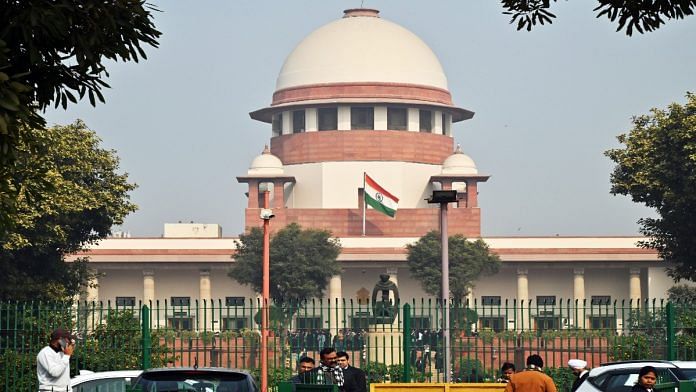New Delhi: Can empirical data from a report that’s been rejected by the central government still be relied upon to decide on a constitutional question? This is what the Supreme Court will look into as it decides whether members of Scheduled Caste/Scheduled Tribes (SC/STs) communities who converted to Islam or Christianity are entitled to reservation.
Hearing a batch of petitions — including one that is 19 years old — seeking reservation for religious converts, a three-judge bench led by Justice Sanjay Kishan Kaul said it would look into whether data from a 2007 Commission for Enquiry (COI) report by the Justice Ranganath Mishra committee on extending SC status to converts should be considered.
What’s the sanctity of the report if the government has rejected it, the bench wondered. “If a report is not accepted, what is the status of the report or the empirical data in it? Can we imbibe any empirical data from the report?” it asked.
The bench also remarked that stigma associated with the caste system doesn’t necessarily go away after conversion.
Constituted in October 2004 to look into various issues related to linguistic and religious minorities in India, the Justice Ranganath Mishra committee had recommended that reservation be extended to Dalit converts to Islam and Christianity. The report was tabled in Parliament in 2009 — two years after it was submitted.
The bench led by Kaul agreed with the petitioners’ argument that the issue can’t be kept pending indefinitely. However, the Modi government urged the court not to hear the case until the Justice K.G. Balakrishnan-led Commission of Inquiry (COI) submits its report.
The CoI was constituted last October to examine whether SC/ST status should be given to those who, despite being members of such communities, couldn’t find themselves enlisted due to their conversion to religions other than Hinduism, Sikhism and Buddhism.
Also Read: Identifying SCs among Dalit Muslims, Christians challenging. Lack of data biggest roadblock
‘Does denying reservation to converts amount to discrimination?’
In December, the Modi government had informed the Supreme Court that it had decided against accepting the Justice Mishra committee’s recommendations.
However, the petitioners argued Wednesday that rejection of the report should not prevent the top court from deciding the constitutional questions that arise in the petitions, such as whether denying reservation to converts would amount to discrimination.
These questions were sketched out by the court in 2011 in one of its orders, the petitioners’ counsel Prashant Bhushan told the court.
Noting that the court had, in December 2022, already delved into whether it should wait for the Justice Balakrishnan-led CoI before proceeding with the hearing, the petitioners said that exercise would take considerable time before its conclusion, leading to delay. Besides, commission reports don’t always see the light of day, they argued, urging the court to continue with the hearing since there is “sufficient material” on record to answer the constitutional issues framed in the January 2011 order.
On his part, advocate Sridhar Potaraju, the counsel for the All India Federation of SC/ST Organizations, opposed the petition, sought to raise some other issues, such as whether the caste system can be imported into Christianity and Islam. The question also needs to be looked at from the perspective of the belief system existing in the religion, he argued.
But Justice Kaul remarked that there are reports stating that the problem of stigma associated with SC/STs isn’t wished away by conversion.
“Whether (or not) they (religion) do not recognise the caste system, the problem remains,” he observed orally.
Despite this, however, the judge pondered if the material on record presented by the petitioners, which is largely the points of view of individuals, can be considered by the court in the case. “These points of view do not have a statutory flavour and the only thing that has a flavour of recognition is the Justice Ranganathan COI report,” Kaul said.
(Edited by Uttara Ramaswamy)
Also Read: BJP Pasmanda outreach biggest disruption since Mandal. Desire for quota rising among Muslims



